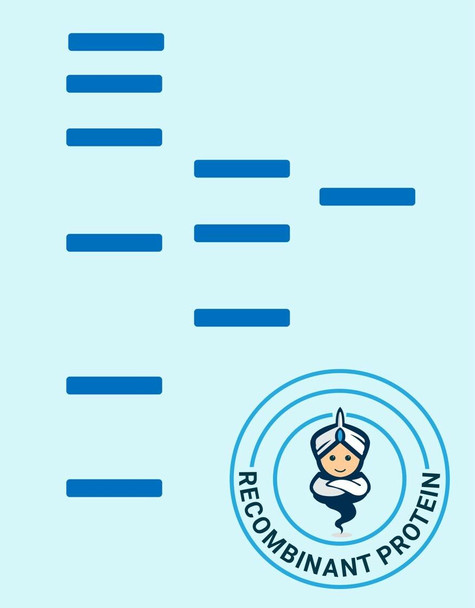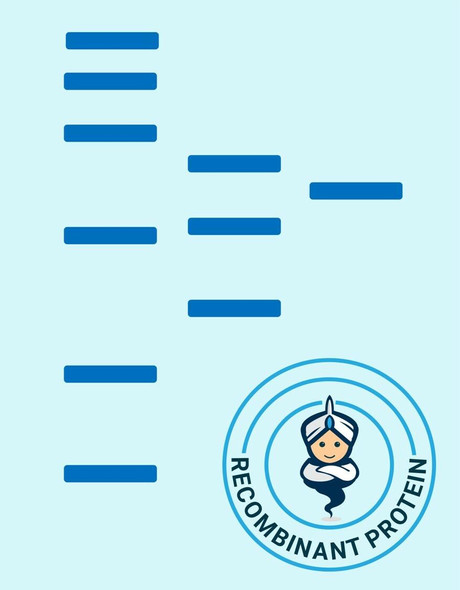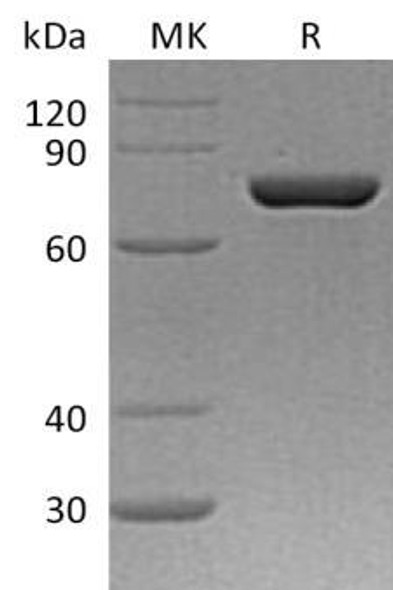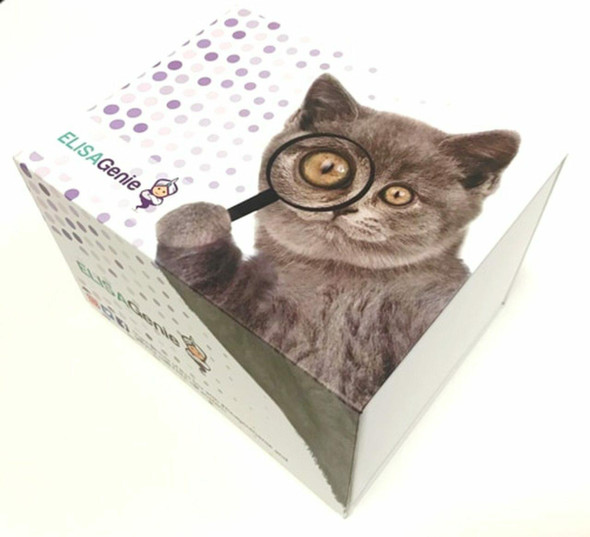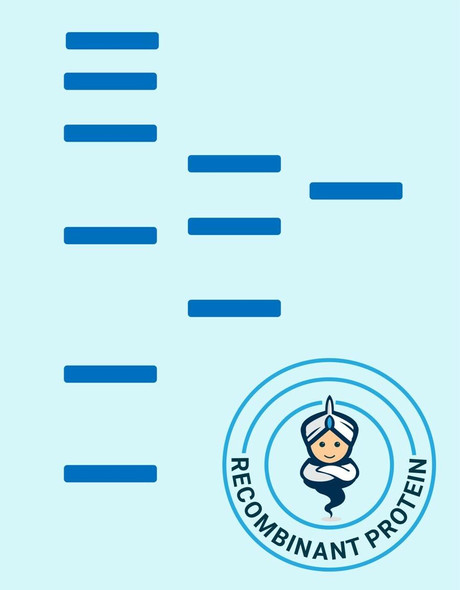Description
| Product Name: | Human PDIA4 Recombinant Protein |
| Product Code: | RPPB2086 |
| Size: | 10µg |
| Species: | Human |
| Target: | PDIA4 |
| Synonyms: | Endoplasmic reticulum resident protein 72, ERP70, ERP72. |
| Source: | Escherichia Coli |
| Physical Appearance: | Sterile filtered colorless solution. |
| Formulation: | The PDIA4 1mg/ml protein solution contains 20mM Tris-HCl, pH-8, 1mM DTT, 0.1M NaCl and 10% glycerol. |
| Stability: | Store at 4°C if entire vial will be used within 2-4 weeks. Store, frozen at -20°C for longer periods of time. For long term storage it is recommended to add a carrier protein (0.1% HSA or BSA). Avoid multiple freeze-thaw cycles. |
| Purity: | Greater than 90.0% as determined by SDS-PAGE. |
| Amino Acid Sequence: | MGSSHHHHHH SSGLVPRGSH MVAGAEGPDE DSSNRENAIE DEEEEEEEDD DEEEDDLEVK EENGVLVLND ANFDNFVADK DTVLLEFYAP WCGHCKQFAP EYEKIANILK DKDPPIPVAK IDATSASVLA SRFDVSGYPT IKILKKGQAV DYEGSRTQEE IVAKVREVSQ PDWTPPPEVT LVLTKENFDE VVNDADIILV EFYAPWCGHC KKLAPEYEKA AKELSKRSPP IPLAKVDATA ETDLAKRFDV SGYPTLKIFR KGRPYDYNGP REKYGIVDYM IEQSGPPSKE ILTLKQVQEF LKDGDDVIII GVFKGESDPA YQQYQDAANN LREDYKFHHT FSTEIAKFLK VSQGQLVVMQ PEKFQSKYEP RSHMMDVQGS TQDSAIKDFV LKYALPLVGH RKVSNDAKRY TRRPLVVVYY SVDFSFDYRA ATQFWRSKVL EVAKDFPEYT FAIADEEDYA GEVKDLGLSE SGEDVNAAIL DESGKKFAME PEEFDSDTLR EFVTAFKKGK LKPVIKSQPV PKNNKGPVKV VVGKTFDSIV MDPKKDVLIE FYAPWCGHCK QLEPVYNSLA KKYKGQKGLV IAKMDATAND VPSDRYKVEG FPTIYFAPSG DKKNPVKFEG GDRDLEHLSK FIEEHATKLS RTKEEL |
| Biological Activity: | Specific activity > 10 A650/cm/min/mg. Enzymatic activity was confirmed by measuring the aggregation of insulin in the presence of DTT. |
PDIA4 is an endoplasmic reticulum luminal protein that is a stress protein as well as a member of the protein disulfide isomerase family of proteins. PDIA4 participates in the catalysis of protein-S-S-bond rearrangement. PDIA4 and PDIA3 function as proteases, protein disulfide isomerases, phospholipases or an arrangement of these.
PDIA4 Human Recombinant produced in E.Coli is a single, non-glycosylated polypeptide chain containing 646 amino acids (21-645 a.a.) and having a molecular weight of 72.9kDa. The PDIA4 is fused to 21 a.a. His-Tag at N-terminus and purified by proprietary chromatographic techniques.
| UniProt Protein Function: | PDIA4: Part a large chaperone multiprotein complex comprising DNAJB11, HSP90B1, HSPA5, HYOU, PDIA2, PDIA4, PDIA6, PPIB, SDF2L1, UGT1A1 and very small amounts of ERP29, but not, or at very low levels, CALR nor CANX. Belongs to the protein disulfide isomerase family. |
| UniProt Protein Details: | Protein type:EC 5.3.4.1; Isomerase; Chaperone; Endoplasmic reticulum Chromosomal Location of Human Ortholog: 7q35 Cellular Component: cell surface; endoplasmic reticulum; endoplasmic reticulum lumen; melanosome Molecular Function:protein binding; protein disulfide isomerase activity Biological Process: protein folding; cell redox homeostasis; protein secretion |
| UniProt Code: | P13667 |
| NCBI GenInfo Identifier: | 119530 |
| NCBI Gene ID: | 9601 |
| NCBI Accession: | P13667.2 |
| UniProt Secondary Accession: | P13667,Q549T6, A8K4K6, |
| UniProt Related Accession: | P13667 |
| Molecular Weight: | 645 |
| NCBI Full Name: | Protein disulfide-isomerase A4 |
| NCBI Synonym Full Names: | protein disulfide isomerase family A, member 4 |
| NCBI Official Symbol: | PDIA4�� |
| NCBI Official Synonym Symbols: | ERP70; ERP72; ERp-72�� |
| NCBI Protein Information: | protein disulfide-isomerase A4; ER protein 70; ER protein 72; protein disulfide isomerase-associated 4; endoplasmic reticulum resident protein 70; endoplasmic reticulum resident protein 72; protein disulfide isomerase related protein (calcium-binding prot |
| UniProt Protein Name: | Protein disulfide-isomerase A4 |
| UniProt Synonym Protein Names: | Endoplasmic reticulum resident protein 70; ER protein 70; ERp70; Endoplasmic reticulum resident protein 72; ER protein 72; ERp-72; ERp72 |
| UniProt Gene Name: | PDIA4�� |
| UniProt Entry Name: | PDIA4_HUMAN |

